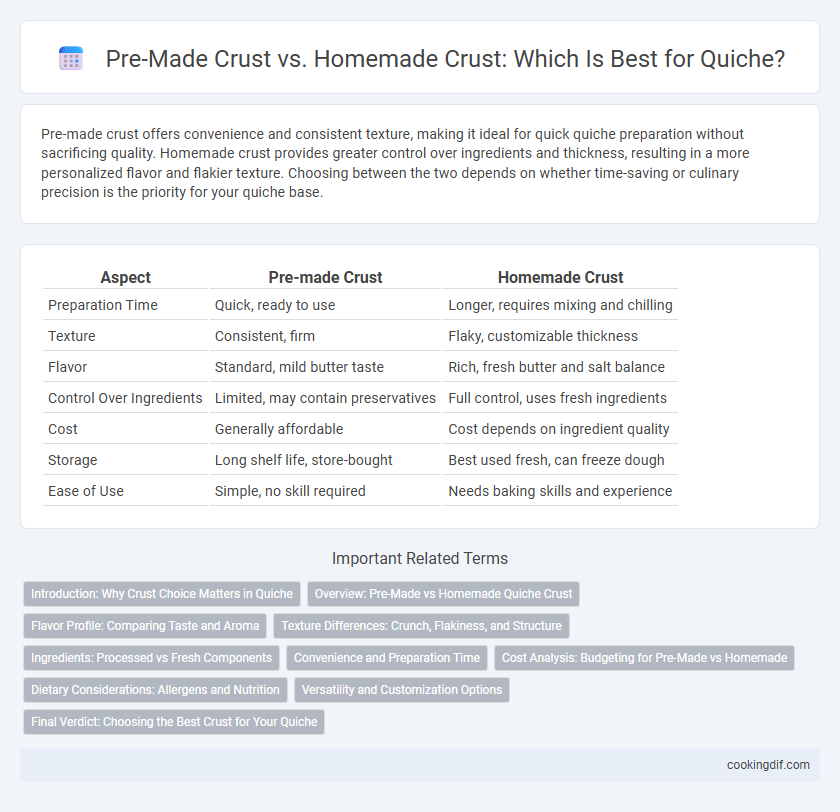Pre-made crust offers convenience and consistent texture, making it ideal for quick quiche preparation without sacrificing quality. Homemade crust provides greater control over ingredients and thickness, resulting in a more personalized flavor and flakier texture. Choosing between the two depends on whether time-saving or culinary precision is the priority for your quiche base.
Table of Comparison
| Aspect | Pre-made Crust | Homemade Crust |
|---|---|---|
| Preparation Time | Quick, ready to use | Longer, requires mixing and chilling |
| Texture | Consistent, firm | Flaky, customizable thickness |
| Flavor | Standard, mild butter taste | Rich, fresh butter and salt balance |
| Control Over Ingredients | Limited, may contain preservatives | Full control, uses fresh ingredients |
| Cost | Generally affordable | Cost depends on ingredient quality |
| Storage | Long shelf life, store-bought | Best used fresh, can freeze dough |
| Ease of Use | Simple, no skill required | Needs baking skills and experience |
Introduction: Why Crust Choice Matters in Quiche
Choosing between pre-made crust and homemade crust significantly impacts the texture and flavor of a quiche base, with homemade crust offering a fresher, flakier result tailored to personal taste. Pre-made crusts provide convenience and consistent thickness, ideal for time-saving and ease of preparation without sacrificing structural integrity. The decision influences not only the overall culinary experience but also the control over ingredients and customization options for dietary preferences.
Overview: Pre-Made vs Homemade Quiche Crust
Pre-made quiche crust offers convenience and consistent texture, often made from refined flour and shortening, which may lack the rich, buttery flavor of homemade crust. Homemade crust allows customization with ingredients like whole wheat flour or butter for enhanced taste and flakiness, though it requires more time and skill to achieve the ideal balance of crispness and tenderness. Choosing between pre-made and homemade crust depends on priorities like preparation time, flavor depth, and texture precision for the perfect quiche base.
Flavor Profile: Comparing Taste and Aroma
Homemade quiche crust offers a richer, buttery flavor with a flaky, tender texture that enhances the overall taste experience, while pre-made crusts tend to have a more neutral, less complex flavor due to mass production and preservatives. The aroma of homemade crust, often infused with fresh butter and sometimes herbs, elevates the sensory appeal, contrasting with the subtler, sometimes artificial scent of pre-made options. Choosing between the two impacts the quiche's flavor depth and aromatic intensity, with homemade crusts generally preferred for gourmet quality.
Texture Differences: Crunch, Flakiness, and Structure
Pre-made quiche crusts offer consistent crunch and a uniform flaky texture ideal for quick preparation, whereas homemade crusts provide a more customizable structure with variable flakiness depending on butter distribution and dough handling. The fat content in homemade crusts creates layers that enhance tenderness, while mass-produced crusts often rely on shortening for a more stable, less delicate crumb. Choosing between pre-made and homemade bases impacts the overall mouthfeel and sturdiness of the quiche, influencing how well it holds fillings during slicing and serving.
Ingredients: Processed vs Fresh Components
Pre-made crusts often contain processed ingredients such as hydrogenated oils, preservatives, and refined flours, which can affect both flavor and nutritional quality. Homemade crusts allow the use of fresh components like real butter, unbleached flour, and natural seasonings, resulting in a richer taste and improved texture. Choosing fresh ingredients enhances the overall quality of the quiche base compared to processed alternatives.
Convenience and Preparation Time
Pre-made crusts offer unmatched convenience, significantly reducing preparation time by eliminating the need for dough mixing, rolling, and chilling. Homemade crusts require more effort and time but allow for customization in texture and flavor, enhancing the overall quiche experience. Choosing pre-made crusts streamlines quiche preparation, making them ideal for quick meals or novice bakers without sacrificing quality.
Cost Analysis: Budgeting for Pre-Made vs Homemade
Pre-made quiche crusts typically cost between $3 to $5 per package, providing convenience and saving time but offering less control over ingredient quality. Homemade crusts require basic ingredients like flour, butter, and salt, often totaling under $2 per pie, making them more cost-effective for frequent baking despite the additional preparation time. Budget-conscious bakers favor homemade crusts to reduce expenses, especially when local ingredient prices are low or pantry staples are available.
Dietary Considerations: Allergens and Nutrition
Pre-made quiche crusts often contain common allergens like wheat, dairy, and sometimes soy, which can be problematic for individuals with food sensitivities or allergies. Homemade crusts offer the flexibility to use alternative flours such as almond, gluten-free, or whole grain options, enhancing nutritional value and catering to specific dietary needs. Controlling ingredients in a homemade crust allows for reduced preservatives, lower sodium levels, and customizable fat content, promoting a healthier quiche base.
Versatility and Customization Options
Pre-made quiche crust offers convenience and consistent texture, making it ideal for quick preparations and standard recipes. Homemade crust allows greater versatility and customization, enabling adjustments to thickness, flavor, and ingredients such as whole wheat or gluten-free options. Choosing homemade crust enhances the ability to tailor the quiche base to specific dietary preferences and flavor profiles.
Final Verdict: Choosing the Best Crust for Your Quiche
Homemade crust offers superior flavor and flaky texture, allowing complete control over ingredients and thickness, making it ideal for gourmet quiches. Pre-made crust provides convenience and consistent results, saving preparation time while delivering a reliable base for quiche fillings. Final choice depends on balancing time constraints with desired taste and texture quality.
pre-made crust vs homemade crust for base Infographic

 cookingdif.com
cookingdif.com